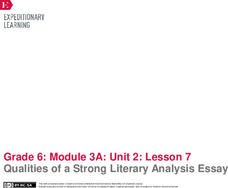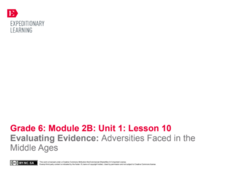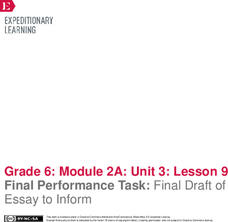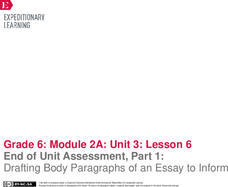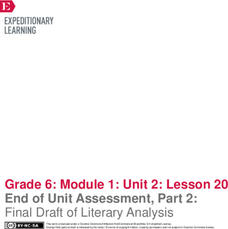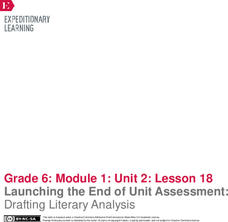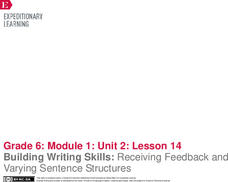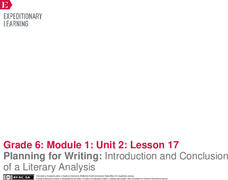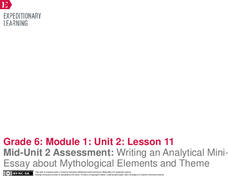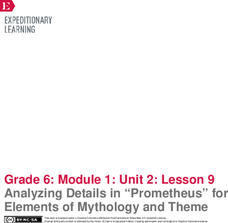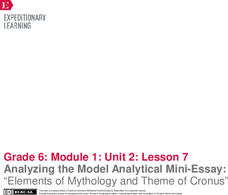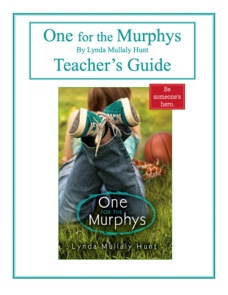EngageNY
Planning for Writing: Introduction and Conclusion of a Literary Analysis Essay
First and last impressions are important. Using the helpful resource, scholars draft the introductory and concluding paragraphs of their literary analysis essays. Next, they use a writing evaluation rubric to self-assess their work.
EngageNY
Qualities of a Strong Literary Analysis Essay
Read like a writer. Scholars read a model literary analysis in preparation for a similar writing assignment before annotating each paragraph for the gist. Next, pupils devise a list of qualities of a strong literary analysis essay.
EngageNY
Performance Task Preparation: Peer Critique and Mini-Lesson Addressing Common Errors: Revising Draft Essay to Inform
Time to revise! Using a writing evaluation rubric, scholars participate in a peer editing process to provide feedback on each others' informative essays. Next, pupils begin revising their drafts based on the feedback they receive.
EngageNY
End of Unit Assessment: Final Essay
This is just the transition phase. Scholars participate in a mini lesson about using transitions in writing. They then have a brief peer critique of the introduction and conclusion paragraphs for their end of unit assessment. Learners...
EngageNY
Drafting Body Paragraphs
That's just the style. Learners begin with a mini-lesson about formal writing style. They then use what they learned about formal writing to begin the body paragraphs for their End of Unit 1 Assessment Prompt: Adversity in the Middle...
EngageNY
Evaluating Evidence: Adversities Faced in the Middle Ages
How is that relevant? Scholars gain an understanding of the words relevant and compelling. They then go back to the End of Unit 1 Assessment Prompt: Adversity in the Middle Ages and look at the second bullet that pertains to relevant and...
EngageNY
Writing to Inform: Analyzing a Model Using a Rubric
Learn to write right. Scholars analyze the model essay Adversity Faced by Townspeople in the Middle Ages. They discuss the essay and make annotations working with an elbow partner. Learners then take another look at the essay using a...
EngageNY
Final Performance Task: Final Draft of Essay to Inform
Sometimes, it's fun to follow the rules. Using their drafts of an evidence-based essay from previous lessons, scholars write their final informative essays about rules to live by. Next, they choose and share quotes from their essays that...
EngageNY
End of Unit Assessment, Part 1: Drafting Body Paragraphs of an Essay to Inform
Anybody can write a body paragraph! Pupils analyze the development of ideas in a body paragraph from a model essay. Next, using what they've learned, they draft the body paragraphs of their My Rule to Live By informative essay.
EngageNY
Mid-Unit Assessment and Establishing a Context for My Hero’s Journey Narrative
How do writers engage their readers in a story? Pupils consider the question and use the informational text, "The Hero's Journey" to justify their plan for their own fictional narrative. To that end, scholars write an explanatory...
EngageNY
End of Unit Assessment, Part 2: Final Draft of Literary Analysis
Row, row, row, row four. Classmates take a look at row four in the writing rubric and begin the exercise by identifying any unfamiliar words. Literary scholars then use feedback from their initial drafts and the writing rubric to begin...
EngageNY
Peer Critique and Pronoun Mini-Lesson: Revising Draft Literary Analysis
See what peers really think. Scholars give a peer critique of the their essay drafts from the previous lesson. They then participate in a mini lesson about pronouns. Pupils write examples of each type of pronoun on sticky notes and put...
EngageNY
Launching the End of Unit Assessment: Drafting Literary Analysis
Is there a connection? Scholars work to write a summary and theme to connect The Lightning Thief and myth of Cronus. They begin by looking at a model essay and then work on their own drafts.
EngageNY
Building Writing Skills: Receiving Feedback and Varying Sentence Structures
Everyone is good at something. Scholars receive their mid-unit assessments with feedback. They look over their papers and write their strengths as a writer and goals on index cards. The class then has a mini lesson in using sentence...
EngageNY
Determining Theme: Reading Myths in “Expert Groups”
Leave it to the experts. Scholars work in expert groups to analyze new myths. Each group is assigned to become an expert on either The
Fates, The Story of Medusa and Athena, or Theseus and the Minotaur. They answer questions and discuss...
EngageNY
Planning for Writing: Introduction and Conclusion of a Literary Analysis
It's all about the introduction. Scholars work on the introductory paragraph for their essays, connecting the theme of a myth and The Lightning Thief. They use a graphic organizer to help focus their work and then move to working on the...
EngageNY
Planning for Writing: Revisiting “Key Elements of Mythology” and Determining a Theme in the Myth of Cronus
Refresh my memory please. Scholars quickly read over the Myth of Cronus to refresh their memories of the story. They then get in groups and write parts of the myth on sticky notes that relate to the elements of mythology, sticking their...
EngageNY
Connecting the Theme of the Expert Group Myth to a Theme in The Lightning Thief and to Life Lessons
Expert groups discuss the theme of their myths and the life lessons people learn from it. They then regroup their triads so that there is a pupil from each expert myth group and share details about their myths. The class also talks about...
EngageNY
Mid-Unit 2 Assessment: Writing an Analytical MiniEssay about Mythological Elements and Theme
Two is company. Scholars pair up to continue their mini essay writing from the previous lesson. They work on their introduction and conclusion paragraphs and then trade partners for peer feedback and a fresh set of eyes on their work....
EngageNY
Drafting an Analytical Mini-Essay: Using Partner Talk and Graphic Organizers to Guide Thinking
Moving on up ... Scholars take a look at how the author of the model essay Elements of Mythology and Theme of Cronus moved up in the writing process from a graphic organizer to an essay. After walking through the writing process of the...
EngageNY
Analyzing Details in “Prometheus” for Elements of Mythology and Theme
Well isn't that clever? Scholars read Prometheus, a tale describes the clever Greek god and trickster. They tune into details and complete graphic organizers that reveal the theme of the text.
EngageNY
Analyzing the Model Analytical Mini-Essay: “Elements of Mythology and Theme of Cronus”
It's time to make a claim. Scholars learn what it means to make a claim by first looking at a model analytical mini-essay to determine how the author relayed ideas. Pupils then work with partners to discuss how the author might have...
EngageNY
Writing with Evidence: Percy and the Hero’s Journey (Chapter 7)
Read, set, write! Scholars participate in the first fully independent writing task of the unit as they write about how Percy’s experience in The Lightning Thief aligns with The Hero’s Journey. To begin their writing, they complete a...
Penguin Books
One for the Murphys by Lynda Mullaly Hunt - Teacher's Guide
Children in foster care face a lot of uncertainty in their lives. A guide for the novel One for the Murphys introduces a main character, Carley, who is thrust into the foster care system. Chapter-by-chapter questions cover key details in...



